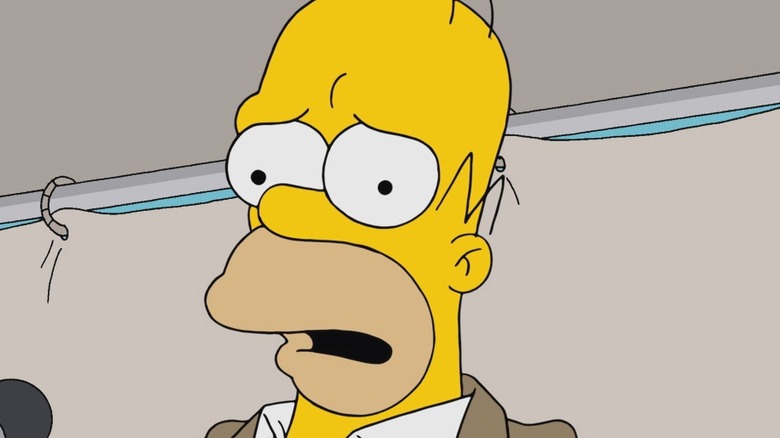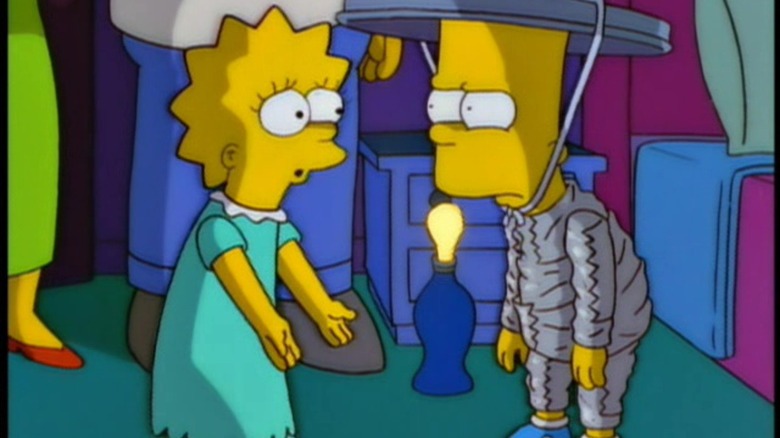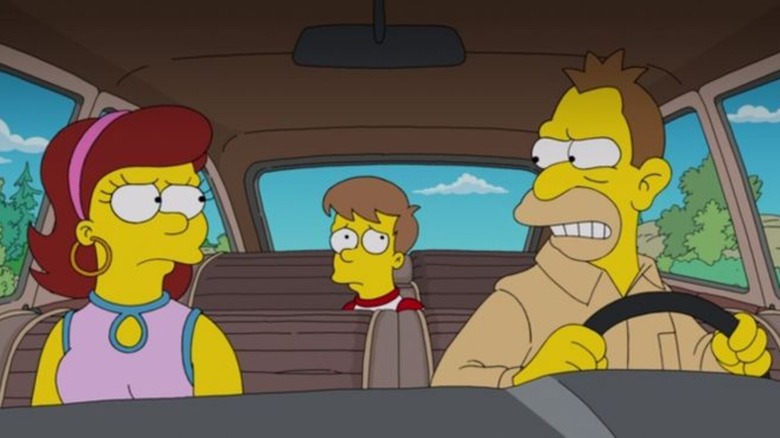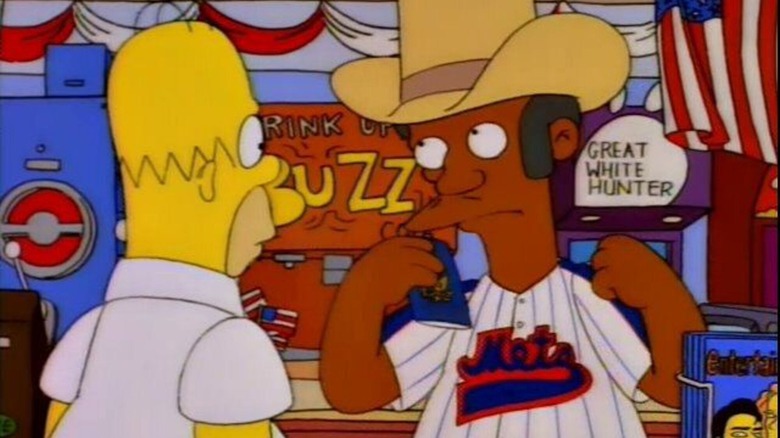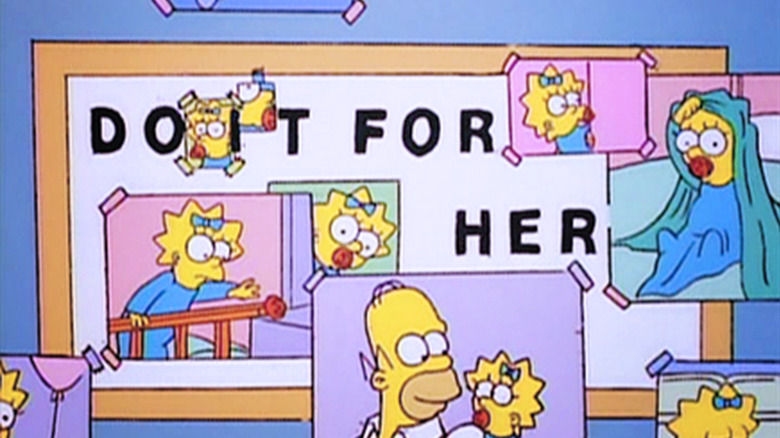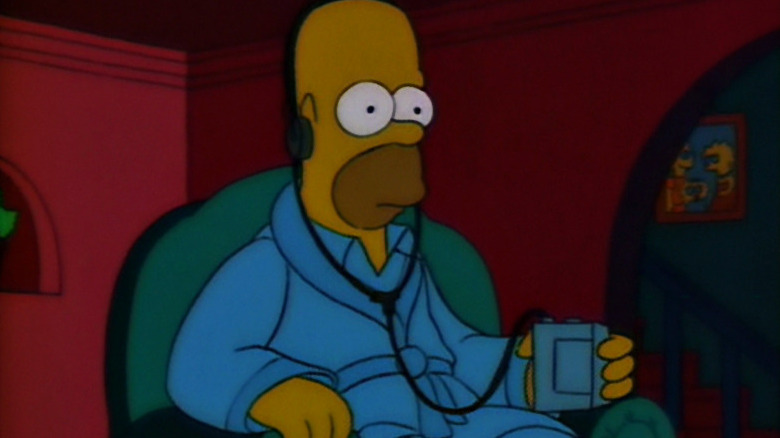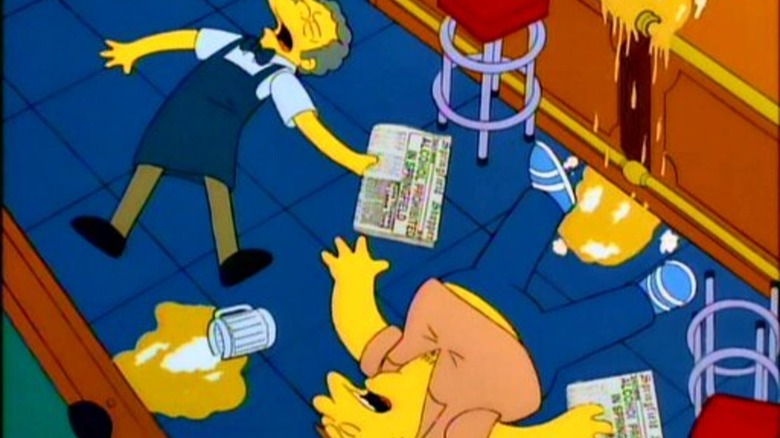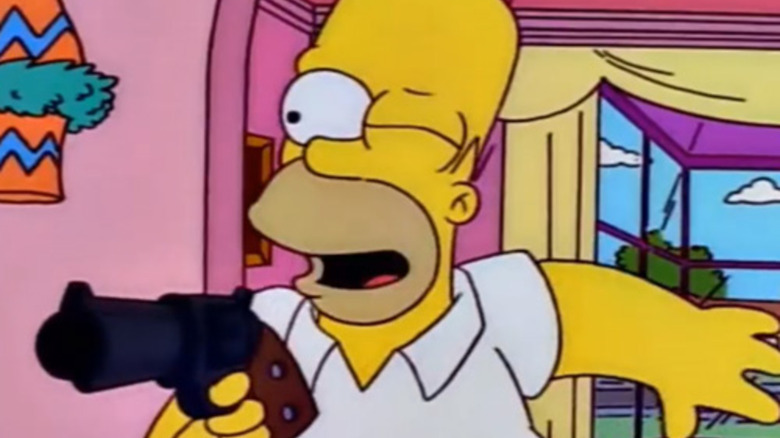Times The Simpsons Addressed Real-World Problems
While "The Simpsons" takes place in the fictional, mysteriously located town of Springfield, the show has always used its made-up setting to talk about real world issues.
From alcoholism to religion, no topic has been placed on a pedestal through the show's 30-plus season run (and counting). Because it's a cartoon, "The Simpsons" is free to talk about such topics in a manner that most live-action settings might make too morose. Conversely, because it's a show whose audience has always been adults and children alike, the show teaches kids about real-world issues with a sarcastic wit that often shows the absurdity of it all, and reminds adults that sometimes we all have to laugh at ourselves — because no matter how important the issue might be, no matter how much you screw it up, you'll never screw it up worse than Homer.
Most of the times, these issues are explored in a comic or satirical manner. But "The Simpsons," particularly in its earlier seasons, was not afraid to mix up its comedy with dark and grounded emotions. Here are 14 memorable times the show got real with its viewers — and the lessons we learned.
Coping with depression
The episode "Homer's Odyssey" was only the third episode of "The Simpsons" to ever air in its very first season. Even that early, the show made it clear that it was not afraid to go super dark in search of authenticity. Nowadays Homer could do any amount of screwups at his job at the nuclear power plant without getting fired, but in that episode, he loses his job after causing a dangerous gas leak.
After getting fired, Homer endures a long day of getting rejected at interviews for other jobs. He can no longer drink beer at Moe's because he has no money left, and Marge has to return to her old job as a waitress to help make ends meet. A desperate Homer robs Bart's piggy bank for cash, and realizing just how far he has sunk, Homer decides to end it all by jumping off a bridge.
A timely intervention by Marge and the kids saves Homer, and he discovers a new mission in life operating as a safety inspector for his town. This new position pits Homer against his former boss, Mr. Burns. In the end, Homer has to choose between his newfound purpose, and his struggle to provide for his family with a steady job.
Children getting put on behavioral medication
In "Brother's Little Helper" (Season 11, Episode 2), Bart is up to his tricks as a troublemaker at school. His latest stunt takes things too far when he floods the entire gym and ruins the school assembly during fire safety talks, albeit saving Ned Flanders' life in the process. Principal Skinner has had enough of Bart's shenanigans, and he declares that Bart suffers from Attention Deficit Disorder (ADD).
To treat Bart's alleged condition, Skinner recommends putting him on a behavioral drug. Since the alternative is Bart getting expelled, Homer and Marge agree to the arrangement. Although Bart resists taking the drug at first, he is eventually convinced to partake of it by Homer. The change in Bart's behavior is rapid, as he becomes more quiet and disciplined. But soon the side effects start showing, as Bart becomes increasingly paranoid and convinced he is being spied upon.
The episode was a stinging critique of children who are placed on drug therapy to make them "calm down," even when it has not been confirmed that they actually suffer from a behavioral disorder. Somewhat surprisingly, the most incisive remark in the entire episode is made by Bart when he tells Homer, "Dad, I admit I have some problems ... but drugs aren't the answer."
Childhood abandonment issues
Homer never had the best relationship with his father Abe, but in the episode "Mother Simpson" (Season 7, Episode 8), we see that his relationship with his mother is even worse. The whole thing starts when Homer fakes his own death to get out of work. News of his death spreads all over the town, and Marge is flooded with condolence messages from family and friends.
Unexpectedly, news of Homer's death also brings his mother Mona into the open. When Homer is finally reunited with his mom, it is revealed that Mona used to be a hippie activist and her crusades brought her into direct conflict with Mr. Burns. Finding herself under threat of arrest, Mona chooses to disappear, even if it means leaving Abe to raise Homer alone.
Homer is overcome with emotion at getting his mother back. It is revealed that when Mona left, Homer assumed it was because he was a terrible son that no mother could ever love. But the reunion does not last long, as Mona's old enemies catch up with her, and she is forced to leave Homer to go on the run again. The final shot of Homer sitting alone on his car looking up at the stars after being abandoned yet again is considered one of the saddest scenes in the show's history.
What it means to be an immigrant
In the last few years, the character of Apu Nahasapeemapetilon came under fire for what some saw as a negative portrayal of Indian Americans, particularly because he was voiced by Hank Azaria, an actor of a different background. But from the start, the character was never just a one-note foreigner. Apu has had some important storylines, and possibly his most famous one occurs in the episode "Much Apu About Nothing" (Season 7, Episode 23).
The episode sees Mayor Quimby blame illegal immigrants for the town's increased taxes. This, in turn, prompts people to demand that all illegal immigrants be deported from Springfield. It turns out that Apu is one such immigrant whose visa expired, forcing him to get a fake one from Fat Tony.
The rest of the episode finds Apu struggling with his identity as an Indian-born American who needs to decide how he wants to behave in a community where foreigners are looked upon with suspicion. In the end, Apu decides that he would rather stay in America than go back to India. Homer and his family help coach Apu as he prepares to take a citizenship test that would make him an official U.S. citizen.
The importance of a caring teacher
The teachers in Springfield are pretty uniformly bad at their jobs. At best, they're indifferent to the task of educating children, at worst they can be downright abusive. But Mr. Bergstrom (Dustin Hoffman in a surprise cameo, billed as "Sam Etic") stands out from the crowd as the best teacher Lisa ever had in "Lisa's Substitute" (Season 2, Episode 19).
Even though Bergstrom was only a substitute, his unorthodox teaching methods and his love for sharing knowledge won Lisa's heart. So much so that she felt devastated when she discovered that his time at Springfield Elementary was up, and he would be leaving the town soon to go to his next teaching post. Before leaving, Bergstrom solidified his place in Lisa's heart by leaving her a note telling her to always be true to herself, and that would be enough to make her way through life.
Aside from highlighting the importance of a caring teacher in the life of a student, the episode was also one of the earliest ones in which we see just how much Homer loves his children. After making up with Lisa at the end of the episode, cheering up Bart who had just lost his class election, and helping Maggie with her pacifier, Homer mentions to Marge that night that he is "on the biggest roll" of his lifetime.
A loss of faith
Ned Flanders is a kind and caring man, one who takes his faith very seriously. The character is such an ideal representation of a Christian man that one of the best episodes of "The Simpsons" revolved around him almost losing his faith.
In "Hurricane Neddy" (Season 8, Episode 8), a series of misfortunes are inflicted upon Ned and his family. A passing hurricane destroys their house. They don't have homeowner's insurance. Ned's shop gets looted. We see one of the most heartbreaking scenes in the show's history when Ned prays, "Why me, Lord? Where have I gone wrong? I've always been nice to people. I don't drink or dance or swear ... I've done everything the Bible says, even the stuff that contradicts the other stuff. What more could I do? I feel like I'm coming apart here. I want to yell out, but I just can't dang-diddily-do-dang, do-dang-diddily-darn do it."
Things get worse when the new house the local townspeople made for the Flanders falls apart. Finally, Ned reaches his breaking point, and is committed to psychiatric care while babbling like a lunatic. After a long, difficult look at his past, and with the help of his friends, Flanders is able to come to terms with his repressed nature. He vows to become more expressive instead of always trying to clamp down on negative emotions.
Giving up your dreams for your family
Homer is often shown to be a negligent parent, aside from all the times he is downright abusive towards Bart. It can be easy to dismiss Homer as a bad parent. But we have also seen many times that Homer cares a great deal for his children. No episode explores this aspect of Homer's nature better than "And Maggie Makes Three" (Season 6, Episode 13).
In flashbacks, we see that there was a time, before Maggie was born, when Homer was offered his dream job of working at a bowling alley. After careful budgeting, Homer concludes that he can quit his hated job at the power plant and work there instead, yet still make enough money to support himself, Marge, Bart, and Lisa.
But then Maggie is born, and Homer's plans are thrown into disarray. He is forced to beg for his old job at the power plant back. His boss Mr. Burns enjoys seeing Homer grovel before him, and puts up a sign at Homer's station which says "Don't forget, you're here forever." In the final scene, we find out that Homer has taped over parts of the sign with pictures of Maggie, so it now reads, "Do it for her."
Facing your impending demise
The episode "One Fish, Two Fish, Blowfish, Blue Fish" (Season 2, Episode 11) showed us Homer at his most grim, as he discovers he has only 24 hours left to live. Not wishing to alarm his children, Homer quietly sets about making a list of things he needs to get done before he dies.
What makes this particular episode so rare not just for a cartoon show, but a comedy show in general is that Homer does not try any outrageous stunts to get out of dying. Instead, the meat of the episode sees Homer trying to get his affairs in order before his time is up. This includes having a heart-to-heart with Bart, listening to Lisa play the saxophone, making a video for Maggie, and having one last drink with his friends at Moe's tavern.
In perhaps most poignant sequence "The Simpsons" has produced thus far, we see Homer say goodbye to his sleeping family at night before going downstairs to await his impending death while listening to the Bible. Even though it finally transpires that Homer is not going to die, and the episode ends on a positive note, we see the kind of man that Homer would be in his final moments, someone who can meet his end with quiet dignity.
Forging a spiritual path
Lisa has always been Springfield's resident skeptic, and this often leads her down unique paths while her family can only watch helplessly from the sidelines. One such adventure occurred in "She of Little Faith" (Season 13, Episode 6), when Lisa grows disillusioned with the Christian faith and strikes out to find her own path to spirituality.
As Lisa tries to discover a new path to God, she comes across a pamphlet bearing the teachings of Buddhism. Intrigued, Lisa visits a Buddhist temple and decides to practice the religion herself. The rest of the episode sees Lisa trying to understand the tenets of her new religion, while friends and family try to get her back into the Christian fold so they can save her soul from burning in Hell.
Aside from examining existential questions regarding faith and spirituality, the episode is also a stinging critique of the then-fashionable "Megachurch" culture, where the tenets of Christianity were becoming increasingly more commercialized.
Corruption in the government
Over the years, Lisa has gone from being the precocious tween who dreams of getting good grades to a crusader determined to fix all that is wrong with society. While Lisa's sense of civic duty might get a big grating sometimes, the episode "Mr. Lisa goes to Washington" (Season 3, Episode 2) features one of the best storylines about Lisa's struggles against an imperfect world.
The episode starts with Lisa wining a competition to write a patriotic essay. The prize is for Lisa and her family to go to Washington to see American democracy in action. But a journey that started out so joyfully for Lisa turns to ashes when she sees her favorite politician accepting a bribe. This prompts her to become disillusioned with the very concept of democracy, and the final essay she reads in front of the public is a bitter denunciation of government corruption.
The episode was met with a bit of controversy over its subject matter. Shortly after it aired, then-President George Bush said at a pep rally, "We are going to keep on trying to strengthen the American family, to make American families a lot more like the Waltons and a lot less like the Simpsons," which was seen as criticism for the show's jabs at the country's government. In any case, "Mr. Lisa goes to Washington" has often figured on lists of the best episodes of "The Simpsons."
The plight of teachers
Just as certain episodes took Lisa from straight-A student to social justice crusader, other episodes established Bart as not just a tween prankster, but a shrewd mastermind who could turn the whole town on its head. "The PTA Disbands!" (Season 6, Episode 21) was one such episode that saw Bart facing off against his entire school faculty.
The episode starts with a series of mishaps that make it painfully clear that Springfield Elementary, the school Bart and Lisa attend, is dangerously underfunded. Their teacher Edna Krabapel calls a meeting of the Teachers' Union of Springfield Elementary to demand that Principal Skinner funnel more money into fixing up the school and supplying appropriate teaching materials.
But due to Bart's expert machinations, Skinner and Krabapel grow increasingly hostile towards each other, and the standoff escalates. The episode paints a telling portrait of the dangers of underfunded educational institutions, and what happens when people who have no business being teachers are forced into teaching positions.
The pointlessness of prohibition laws
Beer is an important part of Homer's life, and it seems to be the lifeblood for a lot of people and businesses in Springfield. The episode "Homer vs. the Eighteenth Amendment" (Season 8, Episode 18) explored what would happen if prohibition-era laws made a comeback.
In the episode, a 200-year-old law is unearthed which states that the buying and selling of alcohol is banned in Springfield. With great reluctance, Mayor Quimby announces that the town must now become alcohol-free. To enforce the new rule, a special officer is brought in with very strict views against alcoholic beverages. However, this new strict approach does nothing to quench people's desire for the stuff.
Soon, Homer finds himself working as a bootlegger to keep Moe's Tavern supplied with plentiful beer. Nicknamed "The Beer Baron" by the media, Homer lands in increasing danger as the police force closes in around his operation. The episode ends with the law no longer under effect, but with the lesson learned that trying to ban people from doing something only makes them resort to creative methods to get around the ban instead of obeying it.
The state of gun laws
Homer has never shown much interest in guns. But the episode "The Cartridge Family" (Season 9, Episode 5) showed Homer with a newfound fascination for firearms. In the process, the episode also explored the nature of gun laws in America, and a cultural fascination with firearms that can often turn deadly.
In the beginning, Homer purchases a gun to keep his family safe. But it soon becomes clear that he is not responsible enough to own a firearm. This prompts Marge to make a rare stand against Homer and deliver an ultimatum that drives the rest of the episode's plot. "Homer, I think you'd agree that I've put up with a lot in this marriage," she says. "But this is the first time since we've been married that I've actually feared for our lives. So I'm asking you, if you really care about me and the children ... please, please get rid of the gun."
Rather than being pro or anti "gun laws," the episode tries to present a balanced picture from both sides of the argument. In the end, Homer gives up his gun after admitting that holding it made him feel powerful, but not before he uses the gun to foil a robbery to show that owning firearms can have its uses.
The importance of living in the moment
Since Homer and Marge are the oldest main character of "The Simpsons," they often get the episodes with the most existential or philosophical themes. Lisa also has had her share of episodes involving deep and nuanced topics. Yet, perhaps the most important existential question the show ever posed was in a Bart-centric episode titled "A Totally Fun Thing That Bart Will Never Do Again" (Season 23, Episode 19).
In the episode, Bart and his family go on a cruise where Bart has the time of his life. Unwilling to give up the good times and go back to his humdrum life, Bart convinces the crew and passengers of the cruise ship that a deadly virus has attacked the rest of the world (a sub-plot that hits quite different after 2020). The people on the ship are forced to remain at sea until Bart's subterfuge is found out.
In the end, Bart admits that he is struggling to accept that fun things end all too quickly, and most of life is just boredom and drudgery. Lisa explains to him that just because life can get hard for long stretches doesn't mean you should stop enjoying the little moments of joy that you manage to find along the way. This leads to Homer making possibly his wisest statement ever, when he tells Bart to stop worrying about the future and live in the moment: "Stop thinking about fun and have it."
